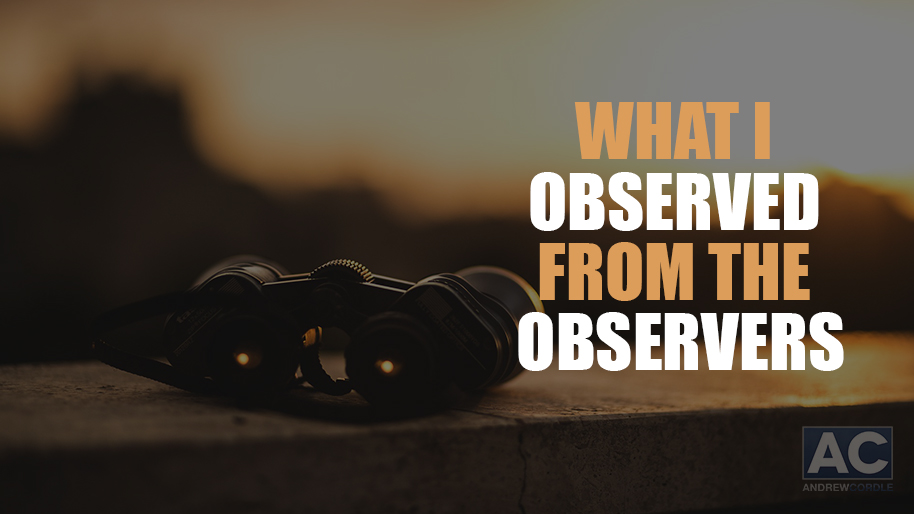What I Observed from the Observers
January 11, 2016

In a recent WSJ article titled, “What to Expect in 2016,” 12 writers gave their take on the future. The topics ranged from politics in the USA to the future of ISIS, banking, bookstores, energy, genetics and so forth. I enjoyed the articles and the authors’ insights. As I paused to reflect on the articles, my own insights began to form with respect. Not to the authors’ opinions individually. But to the whole concept that appeared as a sort of sub-plot from the whole. I came away with four observations I wanted to share with you as we look ahead to what could happen in your life and business this New Year. If you developed the right kind of attitudes in leadership.
First, those who interest us most and those who often impact our lives the most are the dreamers and visionaries. Humans are hard-wired to seek to better their lives and conditions. For proof, I call upon your memory of the images of masses of emigrants fleeing oppressive and hostile regimes in Syria and Northern Africa. Risking all in hope of a better life. All of us felt the tug on our heart and the lump in our throat as we saw images of tiny little bodies lying limp and lifeless on the shores where boats capsized or where waves and tides washed them ashore. Tiny testaments that spoke volumes to the dreams and risks. Yet, the dreamers continued to emigrate, unstopped by even the most crushing of losses.
Once a dream has found fertile soil in a man’s soul, hell itself cannot burn it out. Death cannot kill it. A man without a dream is a man without hope. But a man with a dream will endure beyond hopelessness. What are you dreaming about this year? I’m not talking about the carnal and coarse silly dreams of languid fantasies in idle moments. No, I’m talking about dreams of what you could do potentially in your business, in your lifetime. Do you ever dream of what you would do with success if you were to achieve it? Are you a visionary who can “see” his/her future as though it were actually happening now?
Do you see the influence for good you could have?
Secondly, I looked at all 12 articles and understood there were no negative or pessimistic tones in any of them. Leaders are optimists. It’s not that leaders don’t see the negative parts of life. But they see them as opportunities to change. Honest leaders know bad things happen in life. There is an ad on TV by a retirement investment company that shows people writing down their perspectives on their pasts and their futures on different colored pieces of paper. The past is abundant with both negative and positive colors, while the future is primarily filled with positive colors. Leaders see that and understand that while the negatives are often unavoidable, people want hope, they want to follow someone who believes in their potential, their best – someone who will strive to help them become “all that they can be,” to borrow a U.S. Army slogan.
In truth, a pessimist may be right more often than an optimist, but who wants to follow such a person? Your staff or employees or co-workers are not as interested in your accurate negative predictions as much as they are interested in your positive spirit around them. Truly inspiring leaders are optimistic realists. They know the facts, but they believe they can impact them for good.
My third observation is leaders who impact us are not afraid to tackle the tough subjects. None of the 12 articles were about who will win the Super bowl. Or about who will win the World Series or win an Oscar or an Emmy. Those topics may be interesting conversation with buddies and co-workers, but practically no one will have his/her life changed by the outcomes of those predictions. We tend to banter away our lives discussing trivial matters, often making Fantasy Football appear to be hugely important while we ignore the elephant in the room.
I’ve been encouraged to see in recent months that there are a few significant companies taking a strong hands-on approach to problems in the office environment and addressing weaknesses and poor performance. Instead of the “share the blame” mentality, aggressive growth companies are recognizing it is not compassionate leadership to allow poor performers to hide amid the crowd or to let their co-workers take the blame for their incompetence. Business, and especially politics, needs to have many wake-up calls and get away from social engineering and political correctness. And good leaders tackle problems head on.they don’t pass the buck, they don’t dodge any unpleasantness and they hold their workers to the same standards. Kudos to them!
Finally, I observed from the 12 writers that influential leaders not only expect change, they embrace it, even when it means THEY have to do the changing personally. By change, I am referring to the often uncomfortable changes that are necessary to bring about a positive and successful result. We all can’t have our own way all the time, or even most of the time. At some point, one must put on big boy pants and stop pouting about having to make too many changes. Stubborn people who refuse to budge are often left behind – without a job and with a bleak future.
Yes, change can mean risk and discomfort, but sometimes risk is required. Leaving ones’ homeland and forfeiting all one’s belongings and risking a dangerous trek across an unpredictable sea would be extremely discomforting, even to those who discover the freedom and liberty they were seeking. If you expect to reach your potential, expect to have to change in many areas. If what you are doing is not working, you must change what you are doing. Otherwise, you must learn to be satisfied with the mediocrity that attaches to those unwilling to change.













